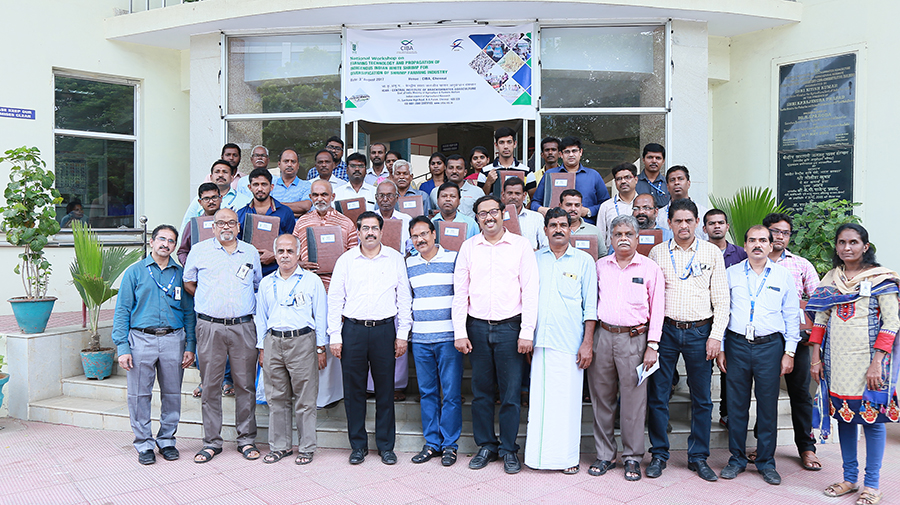The brackishwater aquaculture sector in India has evolved from a traditional farming activity to a commercial farming activity. Currently, this sector is supported by two main species, the native tiger shrimp (P. monodon) and exotic Pacific white shrimp (P. vannamei).Specific pathogen free Peneaus vannamei offered greater advantage over the indigenous shrimp with this disease free status which lead to its dominance and is now holding 90 per cent share in shrimp cultivation. Scientists from ICAR-Central institute of brackishwater aquaculture (CIBA), a nodal for R& D in brackishwater in the country, are exploring ways to increase farmer’s profitability by promoting species diversification. Research are conducted to assess the performance of the Indian white shrimp P. indicus, which is native of India, in terms of growth, productivity, etc., in comparison with P.vannamei. Successful farming trials of P.indicus have been conducted in 6 maritime states (Odisha, West Bengal, Andhra Pradesh, Tamil Nadu, Kerala and Gujarat) under National Fisheries Development Board (NFDB) funded project at CIBA Chennai to demonstrate and promote this indigenous species as an alternative species as envisaged under “Make in India” programme.
In the 1st phase, the shrimp production of upto 3.0-6.0 tons/ha per crop has been achieved in four months of culture at moderate stocking density (15- . In order to exhibit the results of the demonstration and to disseminate the P.indicus culture technology to shrimp farmers and other stakeholders, a National Workshop on “Farming technology and propagation of indigenous Indian white shrimp for diversification of shrimp farming industry” was conducted at ICAR-CIBA, Chennai on 3rd August 2017. Totally 150 participants including several progressive entrepreneurs, officials from Department of Fisheries, representatives from other ICAR institutes, consultants and others participated in the programme.The workshop meet was opened by V.P. Thandapani , I.A.S, Director DOF,Govt. of TamilNadu . Addressing the large gathering, V.P. Thandapani, I.A.S in his speech, emphasized the need to popularize the indigenous fishes and shrimp species, and avoidance of dependence on foreign species. Dr.K.K.Vijayan emphasized the urgent need to promote the farming of native indigenous species along with the exotic vannamei as a backup to keep the sustainability of shrimp production in the contry. He praised the entrepreneurial attitude of the participating farmers in the progress of aquaculture development and also apprised the gathering about the project’s second phase operation proposal of 40 crore for upscaling the production of Indian white shrimp in 25,000 hectares . Dr Akshaya Panigrahi,PI of the project said that the performance of Indian white shrimp is comparable to the exotic SPF vannamei shrimp and holds a great potential as an alternate species of shrimp for coastal aquaculture in India. Felicitations address was given by Dr.Suresh who stressed upon the importance of quality seed for the indicus culture and Dr.C.Gopal,HOD,CCD who emphasized on the implementation of BMP to the farmers. In this occasion a technology series was unveiled by dignitaries of the meet. Latter ten MOU was signed between CIBA and the farmer groups and their representative from different states to promote P.indicus culture. Under this agreement ICAR-CIBA will partner with the farmer to provide technical guidance with respect to providing quality seed and feed for undertaking P.indicus culture
Technical program of the workshop included all aspects of P.indicus farming technology was organized in which a detailed discussion was held with respect to Nursery and Grow-out Management in reference to P.indicus; Feed management for brackishwater P. indicus aquaculture; Health Management; Genetic Improvement Program for P .indicus . Followed by a farmer scientist interaction meet in which the farmer groups from West Bengal, Odisha, Kerala and Andra pradesh shared their experience and achievements for P.indicus culture. The workshop was concluded with vote of thanks from Dr. C. P. Balasubramanian, Principal Scientist, Crustacean Culture Division.
[Best_Wordpress_Gallery id=”28″ gal_title=”National Workshop on Farming technology – 3 Aug 17″]
